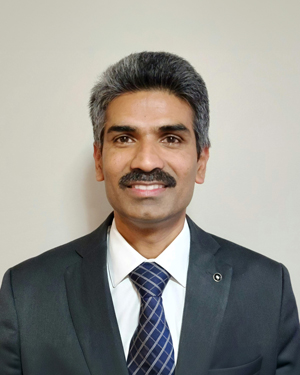
Assistant Professor
Pharmaceutical Sciences
Barry and Judy Silverman College of Pharmacy
Fort Lauderdale/Davie
Dr. Narasimman Gurusamy an Assistant Professor in the Department of Pharmaceutical Sciences at the Barry and Judy Silverman College of Pharmacy, Nova Southeastern University. His academic roots trace back to the Tamil Nadu Dr. MGR Medical University and Birla Institute of Technology in India, from where he embarked on his educational journey in the field of Pharmacy. He further enhanced his academic credentials by obtaining a Ph.D. in Pharmaceutical Sciences from Niigata University of Pharmacy and Applied Life Sciences in Japan. Committed to furthering his knowledge, Dr. Gurusamy undertook postdoctoral fellowships across the USA, where he refined his expertise in molecular cardiology and stem cell biology at esteemed institutions such as UConn Health Center, Harvard Medical School, and the University of Tennessee Health Science Center.
In his professional journey, Dr. Gurusamy has significantly contributed to the field of cardiovascular biology, unveiling critical insights into how autophagy is crucial for cardiac protection. His research has also illuminated the pivotal role of the 14-3-3 protein in regulating cardiac cell death and hypertrophy. Recognized for his innovative work, he has been awarded the American Heart Association Career Development Award for his project focused on "Autologous induced-mesenchymal stem cells and their exosomes therapy for myocardial injury". Currently, his research is aimed at uncovering the epigenetic mechanisms that influence the progression and repair of cardiac diseases, with a particular interest in the unique functions of non-coding RNAs. Beyond his research, Dr. Gurusamy contributes to the academic and professional community as a grant reviewer for the American Heart Association, an Associate Editor for Frontiers in Cardiovascular Medicine, and serves as the Vice-Chair for the Communication Committee of Society for South Asian Heart Research (SAHR).
Dr. Gurusamy’s laboratory employs multidisciplinary approaches to elucidate the role of long non-coding RNAs in the epigenetic regulation of various cardiac diseases and during the intervention-mediated repair.
The team is also investigating the cardioprotective roles of induced mesenchymal stem cells and their exosomes in the protection against ischemic cardiomyopathy.
Furthermore, they are delving into gene-environment interactions by examining how diet and environmental toxins contribute to epigenetic changes that lead to cardiac diseases.
Additionally, the lab is exploring the effectiveness of various interventions, including pharmacological agents, and lifestyle modifications, in altering epigenetic markers and improving outcomes in human diseases.
Research Interests keywords
Epigenetics, Cardiac diseases, non-coding RNA, Exosomes, Stem cells, Autophagy
Research opportunities are available for students in the following areas.